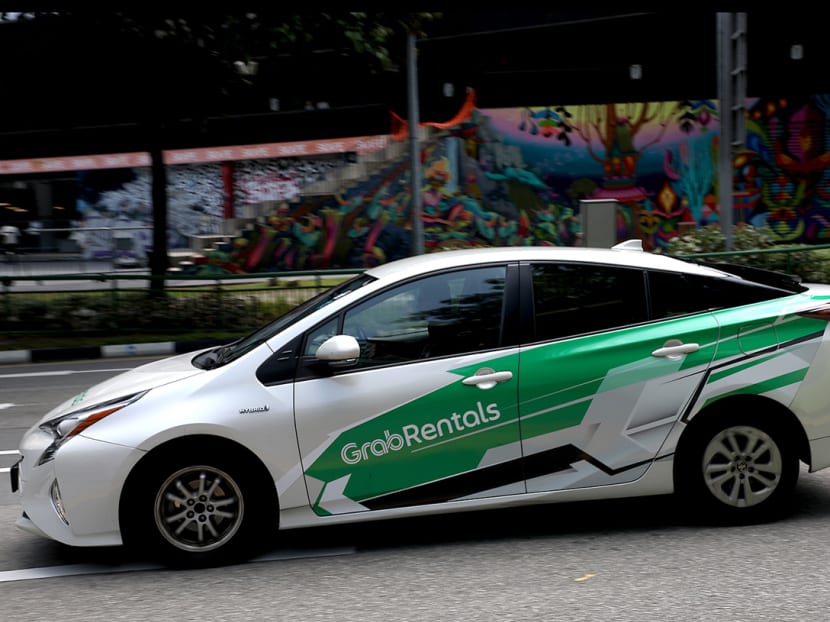Fares of private-hire cars surge as more workers return to office, drivers quit
SINGAPORE — Taking a private-hire vehicle to work in the mornings from her Bedok home to her Marina Bay office has become increasingly pricey for Ms Chen Huiyi.

- Commuters say fares for private-hire vehicle rides have jumped over the past few months
- Experts say that while the cost of petrol is rising, that is not the main reason for the hike is not directly because of that
- The rising demand for these services, with more workers going back to work in offices, is the main factor
- However, a knock-on effect of rising fuel costs is that drivers are leaving the industry for better-paying jobs
SINGAPORE — Taking a private-hire vehicle to work in the mornings from her Bedok home to her Marina Bay office has become increasingly pricey for Ms Chen Huiyi.
During the pandemic, the trip cost S$14 to S$18, but in the few months since the Covid-19 restrictions were eased, it's roughly doubled to around S$30 or more.
The 41-year-old, who works in communications, has also noted longer waiting times for her bookings to be confirmed.
"It’s pretty much impossible to be successful on first try," she said. "So you also waste time trying to book, in addition to the higher fares."
Commuters interviewed by TODAY have echoed Ms Chen's sentiments, with anecdotes of significant jumps in fares for private-hire vehicles in recent months.
Recent sharp petrol price rises may seem like the obvious culprit, but transport industry experts said that the main reason is rising demand for these services as more workers head back to the office.
As ride-hailing firms operate on surge-pricing models, where the fare increases when demand is strong, the higher passenger demand is the key factor driving fares up.
Another factor, the experts added, is that in a tight labour market, some drivers are leaving the industry for better-paying jobs, leaving fewer private-hire cars on the road for the rising number of passengers. Others are driving fewer hours.
However, more costly petrol still has a small part to play, as private-hire platform operators have nudged up fares a little to help compensate their drivers for this increased expense.
Private-hire vehicle and taxi drivers told TODAY that rising petrol costs are eroding their earnings. Some drivers have left the industry while others are planning to do so.
In response to queries from TODAY, a Grab spokesperson said the ride-hailing firm has introduced a "temporary driver fee" of S$0.50 per ride running from April 1 to July 31 that will go fully to its drivers to offset their higher operating costs.
Eligible Grab drivers can also reap the benefits of fuel discounts at all Caltex petrol stations, the spokesperson added.
Over at Gojek, its spokesperson said that a S$0.50 flat fee has been applied to all Gojek trips less than 10km in distance, while trips of 10km and above will be subject to an S$0.80 flat fee, which will go fully to the drivers.
The initiative, running from March 31 to July 31, will "support driver partners' overall earnings amid rising fuel prices".
Ms Yeo Wan Ling, advisor to the National Taxi Association and National Private Hire Vehicles Association, said business for drivers has returned to about 80 per cent of pre-pandemic levels, as a result of the easing of the Covid-19 restrictions.
She noted the various financial measures introduced by platforms so far, but with fuel prices continuing to rise, called on the firms to take further steps to ease the financial burden on drivers.
SOME COMMUTERS SWITCHING TO PUBLIC TRANSPORT
Like Ms Chen, Mr Andrew Wilfred said that he noticed prices for private-hire rides going up in late April and early May, and these surges were primarily for weekday morning and weekend evening rides.
The 36-year-old civil servant said that he typically takes a private-hire car in the morning from Seletar to the central business district, and he has seen prices jump about 50 per cent, from about S$16 at the start of the year to S$23 currently.
As a result, Mr Wilfred has been taking public transport back home after work, when there is "less of a time pressure".
For account manager Toh Tee Kai, the peak hour surges meant that he has resorted to taking public transport as much as he can in recent months, even cycling on some occasions. He used to take private-hire rides about five to seven times a week.
"The prices are quite insane, sometimes it's double (compared to during the pandemic)," the 30-year-old said. "So I plan ahead and try to take public transport."
“The prices are quite insane, sometimes it's double (compared to during the pandemic). So I plan ahead and try to take public transport.Commuter Toh Tee Kai, 30”
PETROL PRICE SPIKE TAKES TOLL ON DRIVERS' INCOME
Echoing concerns shared by taxi drivers earlier this year amid petrol price hikes, private-hire vehicle and taxi drivers interviewed by TODAY this week said that the persistently high fuel costs have resulted in many drivers leaving the industry.
Mr Andy Guan, 40, a taxi driver for 10 years, quit his role two weeks ago due to the rising cost pressures. He said that he had seen a 40 per cent fall in earnings since petrol prices started to hike in February.
He also told TODAY that many drivers have left for similar reasons.
“As of what I know, 40 per cent of my friends are switching over to become food delivery riders. A lot have already done it already and stopped driving.”
Agreeing, Grab driver Alan Chee, 59, said that the 50-cent driver's fee introduced by Grab is insufficient to cover the rise in fuel costs.
"One trip is 50 cents, so that would mean that 10 trips is S$5, so this doesn’t even cover (increased) petrol costs," he said. "The surge (pricing) makes sense, but it only lasts four hours of the day.”
TODAY has asked Grab and Gojek for figures on how many have left the respective platforms since the start of the year.
TODAY has also reached out to taxi firms SMRT, Premier Taxi and Prime Taxi to ask how the firms are supporting drivers as fuel costs rise.
PRICIER RIDES EXPECTED AS AVERAGE INCOMES RISE: EXPERTS
Experts told TODAY that while it is no surprise that fuel costs are contributing to the attrition of private-hire and taxi drivers, it is the sudden surge in demand for rides as Singapore emerges from the pandemic that is the main cause of the price increases.
"During peak hours, we are seeing demand going back close to pre-pandemic levels," said Associate Professor Raymond Ong, from the Department of Civil and Environmental Engineering at the National University of Singapore.
"Based on surge pricing principles, commuters may see fare increases."
Agreeing, transport analyst Terence Fan from the Singapore Management University said demand for private-hire services may be further elevated as people shun public transport as a result of the pandemic and prefer to take private-hire rides to their offices.
"There is this impression that if you're on a car that fetches you from home to work you are exposed less to other people," he said.
On the supply side, many drivers are also leaving the trade, or driving fewer hours, the experts said.
Singapore University of Social Sciences transport economist Walter Theseira said: "(Driver) supply contracted sharply over Covid, and it is difficult to restore at present, given that potential drivers face good job opportunities elsewhere in a growing economy."
“(Driver) supply contracted sharply over Covid, and it is difficult to restore at present, given that potential drivers face good job opportunities elsewhere in a growing economy.Singapore University of Social Sciences transport economist Walter Theseira”
"These costly measures to grow market supply are largely a thing of the past, now that the major platforms are public listed entities and shareholders are concerned about profitability," he said.
Agreeing, transport engineering consultant Gopinath Menon, who has over 40 years of experience in transport management, said that due to the rising petrol costs, drivers who do not quit might hesitate to spend too much time on the roads.
"I have heard private-hire car drivers complaining about rising prices, and shortening the time they are on the roads to cut down dead mileage, but not quitting," he said. "If they shorten the time they are on the roads, the supply decreases."
Prof Ong said that considering alternative energy sources could help to counter future spikes in petrol prices.
"Petrol prices are subject to the global market environment and hence it is necessary to go for a mix of vehicle fleet that is much more energy efficient and hence reduce the cost of operating private hire vehicles," he said.
Ultimately, the long-term solution would be to ensure that the fare structure for the industry keeps in pace with wage increases of the average worker here.
"If both taxi fares and private hire earnings are too low, and the job market is doing well, (drivers) look for regular employment," said Assoc Prof Theseira.
"So commuters who want low prices and high availability have got to ask themselves whether they, too, prefer to look for work in jobs where they get underpaid relative to other opportunities."
Some commuters accept that higher prices are to be expected if the wages of taxi and private hire drivers are to remain competitive.
"As a customer you do want (prices) to be lower, but you also understand that drivers need to make a decent living as well, so you have to accept the balance," said Mr Wilfred, the civil servant.















